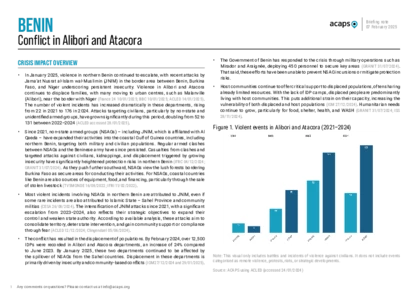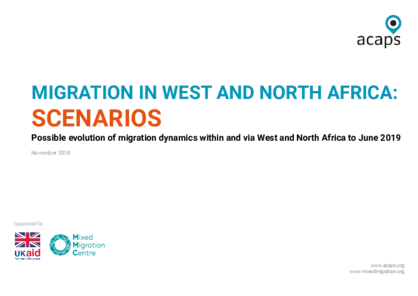Insecurity in the north primarily drives the humanitarian crisis in Benin. Since 2021, non-state armed groups (NSAGs) linked to the Islamic State and Al Qaeda have expanded their activities, particularly in Alibori and Atacora, targeting civilians and security forces. Regular armed clashes between NSAGs and the Beninese army have since persisted. The number of casualties has increased owing to attacks on civilians, kidnappings, and forced displacement from rising insecurity, significantly increasing protection risks in northern Benin.
Around 12,500 IDPs were reported in February 2024, a figure likely to have increased, although updated data is unavailable. The spillover of violence from the Sahel countries has also sharply increased refugee arrivals, with over 16,000 refugees and 7,000 asylum seekers by January 2025, primarily from Burkina Faso, the Central African Republic, and Togo. Displacement and insecurity disrupt agricultural production, contributing to worsening food insecurity.
In September 2024, authorities announced the arrest of political figures accused of planning a coup, increasing tensions despite Benin’s reputation for stability. The closure of Benin’s border with Niger following the 2023 coup has also disrupted trade and humanitarian supply chains, affecting food availability and economic stability before relations improved in late 2024.
(WFP 18/11/2024, UNHCR accessed 05/05/2025, IFRC 19/06/2024, IOM 12/02/2025).
Insecurity in the north primarily drives the humanitarian crisis in Benin. Since 2021, non-state armed groups (NSAGs) linked to the Islamic State and Al Qaeda have expanded their activities, particularly in Alibori and Atacora, targeting civilians and security forces. Regular armed clashes between NSAGs and the Beninese army have since persisted. The number of casualties has increased owing to attacks on civilians, kidnappings, and forced displacement from rising insecurity, significantly increasing protection risks in northern Benin.
Around 12,500 IDPs were reported in February 2024, a figure likely to have increased, although updated data is unavailable. The spillover of violence from the Sahel countries has also sharply increased refugee arrivals, with over 16,000 refugees and 7,000 asylum seekers by January 2025, primarily from Burkina Faso, the Central African Republic, and Togo. Displacement and insecurity disrupt agricultural production, contributing to worsening food insecurity.
In September 2024, authorities announced the arrest of political figures accused of planning a coup, increasing tensions despite Benin’s reputation for stability. The closure of Benin’s border with Niger following the 2023 coup has also disrupted trade and humanitarian supply chains, affecting food availability and economic stability before relations improved in late 2024.
(WFP 18/11/2024, UNHCR accessed 05/05/2025, IFRC 19/06/2024, IOM 12/02/2025).



